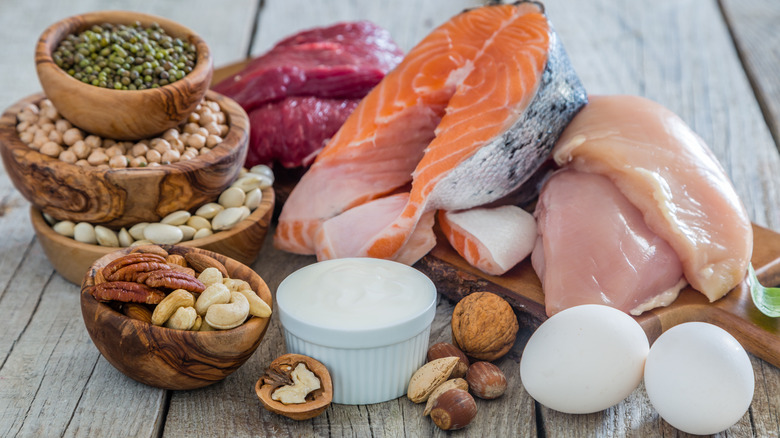How A High Protein Diet Can Reduce Belly Fat, According To A Dietitian
As we grow older, there are a number of factors that can influence where fat may begin to accumulate on the body, all of which will vary from person to person. Hormones and genetics are two predominant contributing factors in particular, reports Harvard Health Publishing. While excess fat buildup has been linked with various health risks, some types of fat may carry more risks than others. For example, UT Southwestern Medical Center reports that excess fat in the hips may pose fewer health risks (as well as potentially safeguard against certain health conditions) than fat accumulation in the belly, which can be particularly harmful in the event that it begins to build up around our organs.
In an exclusive interview with Health Digest, Leonila Campos, registered dietitian and owner of Fueled by Leo, inc., shared how eating high amounts of protein can be beneficial for those who may be interested in reducing belly fat.
"Protein is a macronutrient that provides the building blocks for so many functions in our bodies," Campos states. "Protein does not cause blood sugars to spike [versus], say, consuming starches," she further explains, adding how boosting protein intake also helps minimize cravings and keeps us feeling fuller longer. "In a nutshell, consuming more protein will help you consume less refined carbohydrates, which in turn will help to stabilize blood sugars. Both [refined carb intake and unstable blood sugar levels] contribute to a bigger belly," Campos states.
How much protein constitutes a high-protein diet?
"The goal I give my clients is to aim for at least 25 grams of protein with each meal. You can do this by planning your meals ahead of time to make sure you are hitting those numbers," Campos states. "For example, having 1 cup of egg whites will provide about 25 [grams] of protein. 4 oz of chicken breast will provide about 28 [grams of] protein," she explains. "The key here is to plan ahead and to make each meal protein-focused."
However, Campos notes that there are cases in which a high-protein diet would not be appropriate for a client. "If someone has kidney issues, he/she should consult with a health provider before starting a high-protein diet, as it can affect kidney function," she says.
"If someone has no health issues, [consider] that increasing protein too fast can cause some bloating and stomach discomfort for a short period of time until the digestive system adapts to the new increase," Campos points out. "Another factor to consider is to choose leaner proteins and to add more plant-based protein sources to control cholesterol and maintain heart health," she notes.
Concluding the interview, Campos offers her final piece of advice, stating, "Lastly, I highly recommend working with a registered dietitian so she/he can create a personalized plan and help you reach your goals in a safe and healthy way."


